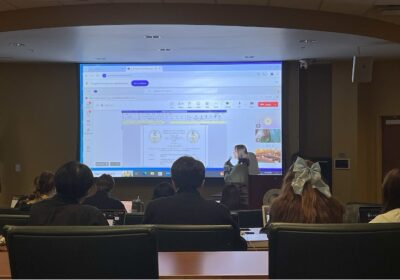SG voting software to change for election

Student Government signed a one year contract with Voatz for new voting software that it hopes will increase voter turnout and Senate’s communication with students.
SPECIAL TO THE ORACLE
Students should be expecting an email during the second week of February with a QR code that will allow them to register to vote in the Student Government (SG) general election.
Elections for senators, the student body president and any referenda placed on the ballot open Feb. 19 with a new voting program. This year, the elections will be run using the Voatz app and system with the hope of increasing voter turnout.
“It’s a mobile focused system so the goal is to make it easier and, at the same time, more accessible, more safe from a security perspective as well,” said Nimit Sawhney, Voatz CEO. “If you don’t have a phone, you can also vote using tablets … and there’s also a way to vote on the website with your official NetID.”
Over the past few years, SG has used a system for elections that was only available online and required a login using the student’s NetID. According to Jennifer Bielen, assistant director for Student Government Advising, Training and Operations, the change in systems to an app will hopefully lead to a larger voter turnout for this year’s election.
Last year, approximately 17.4 percent of the student body voted in the general election, which was an increase from approximately 10 percent the year before.
Students who want to vote at the polling stations that will be around campus during voting week will need to pull up the QR code they were emailed, but will be able to use the tablets at each booth. One will be at the Marshall Student Center each day of voting with the other location moving between the library, The Village, the engineering buildings and the education building.
These QR codes will tell the app what college the student is with and will pull up the appropriate ballot. When logging into the app, it will ask for verification, either through face recognition, a fingerprint or a passcode, which will also need to be given before votes can be officially cast.
“One of the advantages of the platform is because its easy, and once you have the app, you can do elections, multiple events, verified polling, connect with the students without having to send them a bunch of emails which most people ignore,” he said. “This way its direct on the phone, and people can participate at their convenience. You can get more engagement, more feedback. At the same time, in a non-inclusive manner.”
Along with the ability to use the app for elections, SG would have the option to use it throughout the school year to survey students and get student opinions on different issues. It could also provide an option, in the future, to serve as a database of SG representatives for students to be able to check who represents what college and how to contact their representative with an issue.
At the time being, SG signed a one year contract with Voatz, which costs the same as the previous system of around $5,500. However, according to Bielen, if SG chooses to continue using Voatz in subsequent years the cost would drop to $4,000, with the difference being the cost of marketing the new program.
Representatives from Voatz have been on campus and will be around until Friday working to get students on the app ahead of time voting and educating the student body about the new system. On Thursday representatives from Voatz will be at the Greens and Gold Market as well as the Hub, and on Friday they’ll be serving pizza in the MSC.
“I think the other nice thing is that tech support of them being willing to come out this whole week to really urge students to download the app as well as be on hand during the general election,” Bielen said. “But really it’s about to increase voter turnout and to get students to want to be a part of this and to allow their voices to be heard by voting.”
If students don’t want to download the app, they’ll still be able to vote online through the Voatz website or there will be paper ballots available at the different polling locations.
“I think the other thing is that long term, this will have an added benefit to our Senate as this is one program that’s not only going to be able to do the voting in the general and the midterm election, but also if we do surveys for resolutions and things like that, all of those things can be incorporated into this,” Bielen said. “Them being able to pull demographics for us is something that will be an added benefit.”






